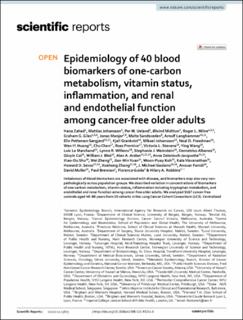Epidemiology of 40 blood biomarkers of one-carbon metabolism, vitamin status, inflammation, and renal and endothelial function among cancer-free older adults
Zahed, Hana; Johansson, Mattias; Ueland, Per Magne; Midttun, Øivind; Milne, Roger L.; Giles, Graham G.; Manjer, Jonas; Sandsveden, Malte; Langhammer, Arnulf; Sørgjerd, Elin Pettersen; Grankvist, Kjell; Johansson, Mikael; Freedman, Neal D.; Huang, Wen-Yi; Chen, Chu; Prentice, Ross; Stevens, Victoria L.; Wang, Ying; Le Marchand, Loic; Wilkens, Lynne R.; Weinstein, Stephanie J.; Albanes, Demetrius; Cai, Qiuyin; Blot, William J.; Arslan, Alan A.; Zeleniuch-Jacquotte, Anne; Shu, Xiao-Ou; Zheng, Wei; Yuan, Jian-Min; Koh, Woon-Puay; Visvanathan, Kala; Sesso, Howard D.; Zhang, Xuehong; Gaziano, J. Michael; Fanidi, Anouar; Muller, David; Brennan, Paul; Guida, Florence; Robbins, Hilary A.
Peer reviewed, Journal article
Published version

Åpne
Permanent lenke
https://hdl.handle.net/11250/2986615Utgivelsesdato
2021Metadata
Vis full innførselSamlinger
Sammendrag
Imbalances of blood biomarkers are associated with disease, and biomarkers may also vary non-pathologically across population groups. We described variation in concentrations of biomarkers of one-carbon metabolism, vitamin status, inflammation including tryptophan metabolism, and endothelial and renal function among cancer-free older adults. We analyzed 5167 cancer-free controls aged 40–80 years from 20 cohorts in the Lung Cancer Cohort Consortium (LC3). Centralized biochemical analyses of 40 biomarkers in plasma or serum were performed. We fit multivariable linear mixed effects models to quantify variation in standardized biomarker log-concentrations across four factors: age, sex, smoking status, and body mass index (BMI). Differences in most biomarkers across most factors were small, with 93% (186/200) of analyses showing an estimated difference lower than 0.25 standard-deviations, although most were statistically significant due to large sample size. The largest difference was for creatinine by sex, which was − 0.91 standard-deviations lower in women than men (95%CI − 0.98; − 0.84). The largest difference by age was for total cysteine (0.40 standard-deviation increase per 10-year increase, 95%CI 0.36; 0.43), and by BMI was for C-reactive protein (0.38 standard-deviation increase per 5-kg/m2 increase, 95%CI 0.34; 0.41). For 31 of 40 markers, the mean difference between current and never smokers was larger than between former and never smokers. A statistically significant (p < 0.05) association with time since smoking cessation was observed for 8 markers, including C-reactive protein, kynurenine, choline, and total homocysteine. We conclude that most blood biomarkers show small variations across demographic characteristics. Patterns by smoking status point to normalization of multiple physiological processes after smoking cessation.
